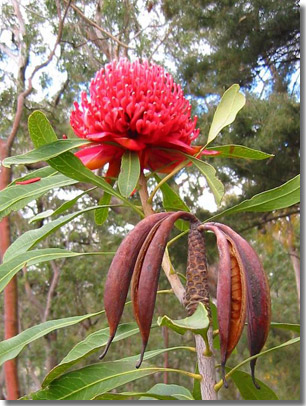
| Search JoyZine with Google Site Search! |
How the Waratah Was Made
Bahmai crept stealthily along the war trail, his eyes fixed on the back of the warrior in front of him, ready to throw himself into the scrub and lie so still that not even the birds could see him. He grasped his war spear and waddy a little more firmly than was necessary, for he had only just passed the initiation tests, and this was his first raiding expedition. The scars were still fresh, but he had forgotten the pain that wracked his body in the excitement of the moment. He was not conscious of his lean figure and the rippling muscles that had won him admiring glances from the young women of his tribe. His training, the ordeals that he had passed through, all the experiences of his young life were gathered together and concentrated in mind and muscle on this wonderful day when at last he was to meet the ultimate test of manhood. He shook his head to clear the red mist that floated before his eyes—a red mist of hatred and exultation that flooded the mind as he thought of the vengeance that would be exacted on the nomadic tribe that had invaded the tribal territory. If he had looked behind and up the slopes of the hill he would have seen a bright patch of colour among the rocks. The leader of the war party had looked at it with narrowed eyes, and then had turned away, recognising it as the wallaby skin garment adorned with red feathers that belonged to Krubi, one of the younger women of the tribe. For a moment he had wondered why she was there, and then dismissed the thought. It was his responsibility to see and interpret every unusual sight or movement; but Bahmai was young and inexperienced, and had no eyes or ears for anything but the trail and the longed-for moment of battle. With an intensity that matched his own, Krubi stared down at Bahmai until he was lost to sight among the trees farther down the valley. She had loved him even before his initiation, and now that he had become a man, her body seemed on fire with longing and tenderness. As the last warrior disappeared from sight, she settled herself in a comfortable position to wait for the return of the raiders. The hot sun seemed to set the rocks on fire, lizards lay motionless, the leaves of the trees hung limply in the still air. The whole world was asleep, but Krubi remained awake, straining her eyes for the first sign of the returning warriors. When the fighting was over, and his spear was reddened with blood, she knew that Bahmai would look up and see her, and that she would be glad because she had waited for him. She knew that the sight of her cloak and feathers would send the blood dancing in his veins, and that soon he would claim her as his wife, and no one would forbid him. The shadows were lengthening as a tiny procession of dark figures emerged from the bush. There were fewer men than in the morning, and they walked slowly with none of the quivering energy of a few hours before. They were too far away for Krubi to see their faces, but she would recognise her love by his slim body, the way he walked, and by the lifting of his head as he sought her among the rocks and bushes of the hillside. One by one the men came into full view, but Bahmai was not among them. Her hands dropped to her side and at that moment she faced the reality that comes to women who cannot relieve their feelings in action, but must wait and sorrow in anguish. She sank to the ground and buried her face in her hands, heedless of the little world of insects and reptiles and birds that were bold enough to approach her. In the morning her people came to take her back to the camp, but she would not move, and refused food when it was offered to her. Each day they returned, but Krubi was as unresponsive to their pleading as one of the boulders on the hillside. Her tears trickled between her fingers and dropped on the stony ground, forming a tiny rivulet which flowed down into the valley. The moistened earth sprang to life, and grass and flowers bloomed along the course of the stream. On the seventh day she stood up, slim and straight as Bahmai her lover had been, and sank slowly into the ground. She disappeared from sight, but the tiny creek still flowed, chattering and singing a song of love and longing. Krubi, for love of her own dead warrior, had left the world as he had done. Long days and nights followed. Underground there was a stirring of new life, roots drew nourishment from the stream, a tender shoot pushed its way between the stones and grew into a tree which became as strong and slender as Bahmai had ever been. It put forth leaves that were like the reddened points of Bahmai's spear, and then a flower that glowed on the hillside like a second sun. It was redder than Krubi's wallaby skin garment—as red as the cockatoo feathers that had adorned it. The tree was the waratah, whose leaves remind us of Bahmai's spear, whose flaming red flowers are the symbol of the love of Krubi and Bahmai. A.W. Reed, Aboriginal Fables & Legendary Tales (Aboriginal Library) |
